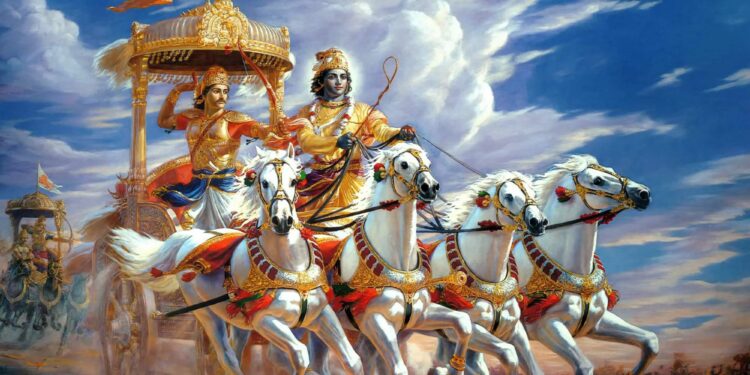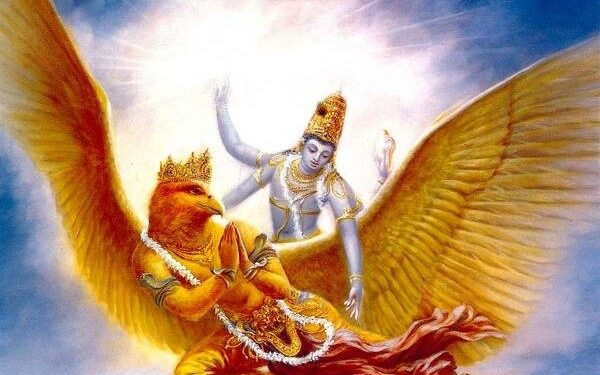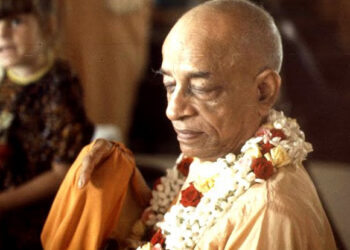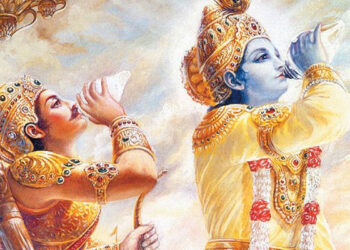TEXT 62
dhyāyato viṣayān puṁsaḥ
saṅgas teṣūpajāyate
saṅgāt sañjāyate kāmaḥ
kāmāt krodho ‘bhijāyate
SYNONYMS
dhyāyataḥ—while contemplating; viṣayān—sense objects; puṁsaḥ—of a person; saṅgaḥ—attachment; teṣu—in the sense objects; upajāyate—develops; saṅgāt—from attachment; sañjāyate—develops; kāmaḥ—desire; kāmāt—from desire; krodhaḥ—anger; abhijāyate—becomes manifest.
TRANSLATION
While contemplating the objects of the senses, a person develops attachment for them, and from such attachment lust develops, and from lust anger arises.
PURPORT
One who is not Kṛṣṇa conscious is subjected to material desires while contemplating the objects of the senses. The senses require real engagements, and if they are not engaged in the transcendental loving service of the Lord, they will certainly seek engagement in the service of materialism. In the material world everyone, including Lord Śiva and Lord Brahmā—to say nothing of other demigods in the heavenly planets—is subjected to the influence of sense objects, and the only method to get out of this puzzle of material existence is to become Kṛṣṇa conscious. Lord Śiva was deep in meditation, but when Pārvatī agitated him for sense pleasure, he agreed to the proposal, and as a result Kārtikeya was born. When Haridāsa Ṭhākura was a young devotee of the Lord, he was similarly allured by the incarnation of Māyā-devī, but Haridāsa easily passed the test because of his unalloyed devotion to Lord Kṛṣṇa. As illustrated in the above-mentioned verse of Śrī Yāmunācārya, a sincere devotee of the Lord shuns all material sense enjoyment due to his higher taste for spiritual enjoyment in the association of the Lord. That is the secret of success. One who is not, therefore, in Kṛṣṇa consciousness, however powerful he may be in controlling the senses by artificial repression, is sure ultimately to fail, for the slightest thought of sense pleasure will agitate him to gratify his desires.
TEXT 63
krodhād bhavati sammohaḥ
sammohāt smṛti-vibhramaḥ
smṛti-bhraṁśād buddhi-nāśo
buddhi-nāśāt praṇaśyati
SYNONYMS
krodhāt—from anger; bhavati—takes place; sammohaḥ—perfect illusion; sammohāt—from illusion; smṛti—of memory; vibhramaḥ—bewilderment; smṛti-bhraṁśāt—after bewilderment of memory; buddhi-nāśaḥ—loss of intelligence; buddhi-nāśāt—and from loss of intelligence; praṇaśyati—one falls down.
TRANSLATION
From anger, complete delusion arises, and from delusion bewilderment of memory. When memory is bewildered, intelligence is lost, and when intelligence is lost one falls down again into the material pool.
PURPORT
Śrīla Rūpa Gosvāmī has given us this direction:
prāpañcikatayā buddhyā
hari-sambandhi-vastunaḥ
mumukṣubhiḥ parityāgo
vairāgyaṁ phalgu kathyate
(Bhakti-rasāmṛta-sindhu 1.2.258)
By development of Kṛṣṇa consciousness one can know that everything has its use in the service of the Lord. Those who are without knowledge of Kṛṣṇa consciousness artificially try to avoid material objects, and as a result, although they desire liberation from material bondage, they do not attain to the perfect stage of renunciation. Their so-called renunciation is called phalgu, or less important. On the other hand, a person in Kṛṣṇa consciousness knows how to use everything in the service of the Lord; therefore he does not become a victim of material consciousness. For example, for an impersonalist, the Lord, or the Absolute, being impersonal, cannot eat. Whereas an impersonalist tries to avoid good eatables, a devotee knows that Kṛṣṇa is the supreme enjoyer and that He eats all that is offered to Him in devotion. So, after offering good eatables to the Lord, the devotee takes the remnants, called prasādam. Thus everything becomes spiritualized, and there is no danger of a downfall. The devotee takes prasādam in Kṛṣṇa consciousness, whereas the nondevotee rejects it as material. The impersonalist, therefore, cannot enjoy life, due to his artificial renunciation; and for this reason, a slight agitation of the mind pulls him down again into the pool of material existence. It is said that such a soul, even though rising up to the point of liberation, falls down again due to his not having support in devotional service.


















